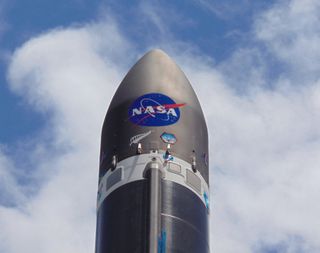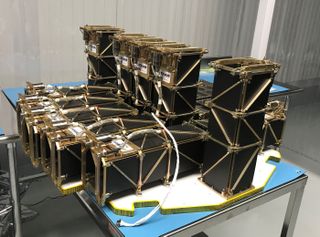Watch Rocket Lab Launch a Cubesat Fleet for NASA Tonight!
Editor's note: Rocket Lab is now aiming for an 11 p.m. EST launch of NASA's ElaNa-19 mission on Saturday, Dec. 15 (0400 Dec. 16 GMT), after several days of bad weather.
Original story: The California-based startup Rocket Lab will launch 10 tiny satellites into orbit for NASA tonight, and you can watch it all live online.
A Rocket Lab Electron booster is scheduled to launch NASA's ElaNa-19 mission from the company's private Launch Complex 1 on the Mahia Peninsula of New Zealand's North Island. Liftoff is scheduled for 11:07 p.m. EST (0407 Dec. 13 GMT) during a 4-hour launch window that closes at 3 a.m. EST (0800 GMT). You can watch live via Rocket Lab's website, beginning about 20 minutes before liftoff. You can also watch the launch here on Space.com, courtesy of Rocket Lab. Bad weather may be a concern for the launch, company officials said.
Tonight's launch will mark Rocket Lab's first flight for NASA and the fourth orbital flight of the company's Electron booster over all. After two test flights (nicknamed "This Is A Test" and "Still Testing"), the company successfully launched its first commercial mission (dubbed "It's Business Time") last month.

For this first flight for NASA, Rocket Lab opted to name the mission in honor of a NASA icon: Sir William Pickering, former head of the U.S. space agency's Jet Propulsion Laboratory.
"For the ELaNa-19 mission, the Electron launch vehicle is named 'This One's For Pickering' in honor of New Zealand-born scientist and former Director of NASA's Jet Propulsion Lab (JPL), Sir William Pickering," according to a Rocket Lab mission overview. "For 22 years, Sir Pickering headed JPL and led the team that developed the first US satellite, Explorer I, launched in 1958."
This launch will be the 19th edition of NASA's Educational Launch of Nanosatellites (ELaNa), and will include "a wide variety of new, on-orbit science and technology demonstrations," NASA said in a press release.
Get the Space.com Newsletter
Breaking space news, the latest updates on rocket launches, skywatching events and more!
"Cubesats on this mission include research measuring radiation in the Van Allen belts to understand their impact on spacecraft, and demonstrating new technologies such as a solar sail blade and a compact robotic manipulator, among others," NASA wrote of the mission.
NASA officials said this will be the first launch for its Venture Class Launch Services, the smallest type of dedicated launch services the space agency uses.
Participating organizations include educational institutions and nonprofit groups, and NASA periodically opens up new opportunities for such organizations to participate. The most recent opportunity closed in late November.
NASA says the goal of ELaNA is to get students interested in science, technology, engineering and mathematics (STEM) and to retain their interest in the field.

The full list of cubesats on the ElaNa-19 mission includes:
ALBUS – NASA Glenn Research Center, Cleveland, Ohio
CeREs – NASA Goddard Space Flight Center, Greenbelt, Maryland
CHOMPTT – University of Florida, Gainesville, Florida
CubeSail – University of Illinois at Urbana-Champaign, Urbana, Illinois
DaVinci – North Idaho STEM Charter Academy, Rathdrum, Idaho
ISX – SRI International/ California Polytechnic University, Menlo Park, California
NMTSat – New Mexico Institute of Mining and Technology, Socorro, New Mexico
RSat – United States Naval Academy, Annapolis, Maryland
Shields-1 – NASA Langley Research Center, Hampton, Virginia
STF-1 – West Virginia University / NASA IV&V, Morgantown, West Virginia
Visit Space.com tonight for complete coverage of Rocket Lab's launch of "This One's For Pickering."
Follow us @Spacedotcom or Facebook. Originally published on Space.com.
Join our Space Forums to keep talking space on the latest missions, night sky and more! And if you have a news tip, correction or comment, let us know at: community@space.com.

Elizabeth Howell (she/her), Ph.D., is a staff writer in the spaceflight channel since 2022 covering diversity, education and gaming as well. She was contributing writer for Space.com for 10 years before joining full-time. Elizabeth's reporting includes multiple exclusives with the White House and Office of the Vice-President of the United States, an exclusive conversation with aspiring space tourist (and NSYNC bassist) Lance Bass, speaking several times with the International Space Station, witnessing five human spaceflight launches on two continents, flying parabolic, working inside a spacesuit, and participating in a simulated Mars mission. Her latest book, "Why Am I Taller?", is co-written with astronaut Dave Williams. Elizabeth holds a Ph.D. and M.Sc. in Space Studies from the University of North Dakota, a Bachelor of Journalism from Canada's Carleton University and a Bachelor of History from Canada's Athabasca University. Elizabeth is also a post-secondary instructor in communications and science at several institutions since 2015; her experience includes developing and teaching an astronomy course at Canada's Algonquin College (with Indigenous content as well) to more than 1,000 students since 2020. Elizabeth first got interested in space after watching the movie Apollo 13 in 1996, and still wants to be an astronaut someday. Mastodon: https://qoto.org/@howellspace
